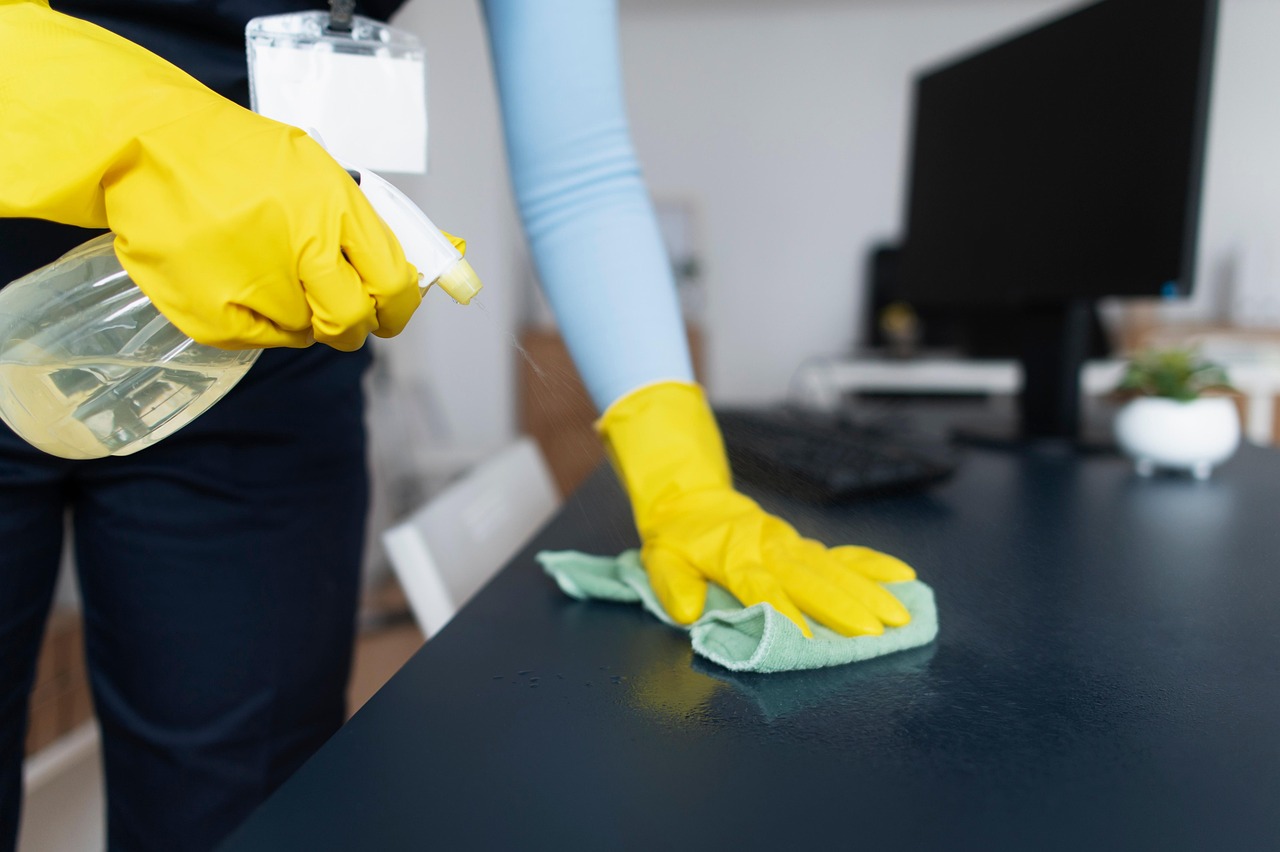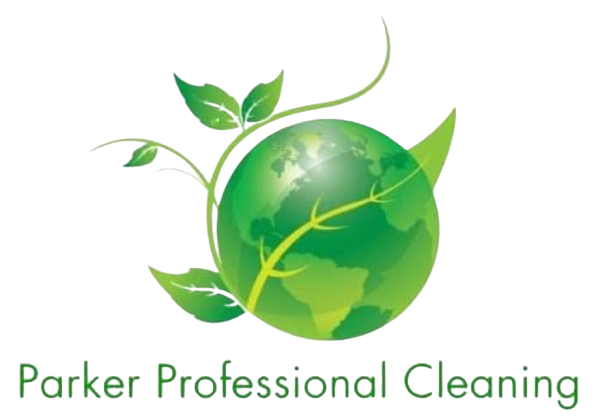- 2615 Sweetwater Spring Blvd G146, Spring Valley CA 91978

Maintaining a clean office isn’t just about appearances. A tidy, well-sanitized workspace supports employee health, productivity, and overall workplace satisfaction. Whether you’re running a small business or managing a large commercial office, implementing practical and consistent cleaning practices is essential. In this guide, we’ll cover ten effective office cleaning tips to help keep your workplace fresh and germ-free, all year round.
Offices are busy places. With employees, clients, and vendors moving in and out, it’s no surprise that germs and clutter can accumulate quickly. Dusty desks, dirty keyboards, overflowing trash bins, and grimy breakrooms not only look unappealing but can also contribute to illness and discomfort.
Proper cleaning routines improve indoor air quality, reduce the spread of germs, and boost employee morale. When your workspace feels clean and organized, people are more likely to stay focused and take pride in their surroundings. Regular attention to cleanliness also extends the lifespan of office furniture, flooring, and equipment.
One of the most useful office cleaning tips is to develop a clear and consistent cleaning schedule. Instead of waiting for things to get noticeably dirty, a proactive schedule ensures that daily, weekly, and monthly tasks are performed on time. This includes vacuuming, wiping down surfaces, sanitizing bathrooms, and restocking supplies.
Assign responsibilities to specific team members or hire a professional cleaning service. Either way, the goal is to prevent messes from building up and becoming unmanageable. Having a set routine also makes it easier to maintain a sanitary environment without interrupting the flow of work.
Germs often spread through high-touch surfaces like door handles, light switches, elevator buttons, keyboards, and shared office equipment. These areas are used frequently throughout the day by many people, making them hotspots for bacteria and viruses.
Make sure these surfaces are disinfected regularly, ideally multiple times a day in high-traffic areas. Use appropriate disinfectant sprays or wipes that are safe for both electronics and surfaces. This small but impactful step can significantly reduce the risk of spreading illness throughout the office.
Cluttered desks aren’t just distracting—they also make cleaning harder. Papers, food wrappers, and personal items can trap dust and crumbs, creating a less hygienic workspace. Encourage employees to keep their desks clean and tidy at the end of each day.
Providing organizational tools like filing trays, desk organizers, and trash bins can help maintain order. A clean desk policy, where employees clear their work areas before leaving for the day, helps cleaning staff reach surfaces easily and ensures no personal items are accidentally discarded.
The office breakroom can be one of the messiest and most neglected areas in any workplace. Coffee spills, crumbs, and leftover food can pile up quickly, leading to unpleasant odors and even attracting pests. Keeping this space clean is important not just for hygiene, but also for employee morale.
Clean the microwave, fridge, sink, and countertops regularly. Encourage employees to label and remove their food weekly and empty the trash daily. Wipe down tables and chairs after each use and ensure shared utensils are properly cleaned. A tidy breakroom promotes healthier habits and a better office culture.
Office restrooms are used by everyone, making them one of the most important areas to keep clean. Dirty restrooms not only spread germs but also create a negative impression on clients and staff. Regular cleaning and disinfection are essential to keep restrooms safe and pleasant.
Restrooms should be cleaned at least once a day, with more frequent cleanings for high-traffic offices. Make sure soap dispensers are full, paper towels are stocked, and toilets are properly sanitized. Using touch-free fixtures, like automatic faucets and hand dryers, can also reduce germ transmission.
Whether it’s carpet, tile, or hardwood, office flooring endures heavy use. Dirt, dust, and debris can accumulate quickly, especially near entrances and common areas. Clean floors not only look better but also contribute to better air quality and safety by reducing slips and falls.
Vacuum carpets daily, especially in busy areas, and mop hard floors regularly. Deep cleaning and professional carpet shampooing should be done periodically to remove embedded dirt and stains. Placing floor mats near entryways can also reduce the amount of dirt brought in from outside.
Overflowing trash bins create an unsanitary and unpleasant work environment. Set a daily routine to empty all trash and recycling bins, especially in kitchens and restrooms. Not only does this help control odors, but it also prevents the spread of bacteria.
Make sure bins are clearly labeled to encourage proper waste separation. Provide enough bins throughout the office to make it easy for employees to dispose of items correctly. Consider using bins with lids to contain odors and reduce the risk of pests.
Cleanliness shouldn’t fall solely on your janitorial staff. One of the most valuable office cleaning tips is to create a workplace culture that promotes cleanliness and accountability. Encourage employees to wipe down their desks, sanitize their hands, and maintain tidy common areas.
Putting up friendly reminders, providing cleaning wipes and hand sanitizer stations, and organizing occasional office cleanup days can go a long way in building a shared sense of responsibility. When everyone pitches in, the office stays cleaner with less effort.
Using the correct cleaning products ensures that surfaces are cleaned effectively without causing damage. For instance, using harsh chemicals on electronics or wood can result in permanent damage. Choose disinfectants that are safe for specific surfaces and always follow manufacturer guidelines.
Green cleaning products are another great option for environmentally conscious workplaces. These products reduce chemical exposure and are generally safer for employees with sensitivities. No matter what products you choose, proper training on their usage is essential for safety and effectiveness.
While daily cleaning keeps surfaces in check, deep cleanings are necessary to address the areas that regular routines miss. Deep cleaning may include shampooing carpets, washing windows, disinfecting upholstery, cleaning behind furniture, and treating air ducts.
It’s a good idea to schedule deep cleaning services quarterly or at least twice a year, depending on the size and usage of your office. Professional cleaning companies can provide specialized tools and expertise to thoroughly sanitize and refresh your workspace.
Implementing consistent cleaning practices is one of the smartest ways to maintain a professional, healthy, and welcoming office environment. A clean workspace reduces distractions, prevents illness, and creates a sense of order that benefits everyone.
These office cleaning tips are not just for janitorial teams—they’re for everyone. When employees, management, and cleaning staff work together, cleanliness becomes a natural part of your workplace culture.
If you’re looking for expert help in maintaining a spotless workspace, Parker Professional Cleaning offers dependable office cleaning services tailored to your business needs. Contact us today to schedule a FREE consultation and discover how we can help keep your office fresh, germ-free, and ready for success.

Proud to be a BBB-accredited, 5-Star rated cleaning company serving San Diego County. We focus on reliable service, quality results, and safe, eco-friendly solutions for every space.

San Diego
Chula Vista
El Cajon
La Mesa
Escondido
Oceanside
Carlsbad
National City
Santee
Poway
Vista
San Marcos
Encinitas
© 2026 Copyright Parkersprofessionalcleaning. All Right Reserved. | Privacy Policy | Terms and Conditions